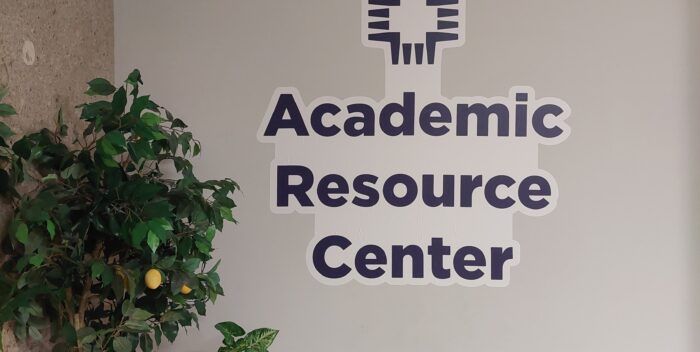Concordia serves students with ADA accomodations, addresses building compliances
The Academic Resource Center in Link Library helps with student accommodations.
Photo credit: Nora Betts
By Mi-Ree Zwick
Concordia Nebraska works to comply with the Americans with Disabilities Act and Section 504 under the Rehabilitation Act when doing new building projects on campus and renovating older facilities.
ADA compliance refers to ensuring that physical locations, digital spaces and other areas are accessible to people with disabilities. Buildings, transportation, websites and digital content must be accessible to those with disabilities. Section 504 compliance ensures equal access and prevents discrimination against individuals with disabilities. It requires providing reasonable accommodations, auxiliary aids and services to ensure individuals with disabilities can participate fully.
For schools that receive federal funding, compliance with ADA and Section 504 is required. Concordia receives federal funding through the Free Application for Student Aid program, so staff and faculty must adhere to Section 504. However, it does not receive federal funding for buildings and grounds. Therefore, it is not required by law for the campus facilities to be ADA compliant.
Chief Executive Vice President Dave Kumm often deals with the campus building projects, renovations, and facility upgrades.
“We are not required by law as a nonprofit to be fully ADA compliant,” said Kumm. “But we feel it’s who we are. I would say that we need to adapt to ADA, so we do take it very seriously whenever we’re doing any type of restructure.”
All buildings, except for the dorms and Founders Hall, have elevators and other accessibility features, such as in bathrooms. The Borland Center for Music and Theater, which includes a new addition and renovations to the old music building, has accessibility features, such as an elevator, ramps and accessible bathrooms.
Kumm said the elevator at Link Library is not ADA compliant but making it compliant is a priority on the school’s to-do list.
Jonathan is the only dorm that is fully compliant with the ADA, but other dorms meet requirements for older buildings. Some students with disabilities who live in the dorms have minor modifications done to accommodate their needs.
“I want students to know that we are very conscientious in meeting their needs,” said Kumm. “It’s minor things like that we need to look at and we’ll probably deal with those one at a time.”
An example of this is modifying fire alarms for students who are deaf.
Kumm said students who have accessibility problems should let the Student Life Office know so it can help resolve the problem.
Section 504 handles accommodations relevant to programs and activities. It typically means that students are given accommodations in the classroom and in their daily activities.
Concordia has an Academic Resource Center and Disability Support Services for students on campus. The ARC is academic support for undergraduate students on campus. Director Suzanne Showers meets with students who seek accommodation for academic, dietary, housing and emotional support animal needs.
“We will meet with students and often students reach out even prior to making a decision to come here and talk about what their needs are related to their disability, how it impacts them, and how it impacts any activities of daily living like sleeping, accessing the laundry room or kitchen spaces,” Showers said.
Anne Aschmann, a senior living off campus, has sought out services on campus since she was a freshman.
“We just kind of had a meeting, figured out what plan made sense, and it was pretty simple,” said Aschmann.
Most of her accommodations involved regularly eating in class and during long testing periods due to her diabetes. She also has a service dog on campus, but she does not need to have an accommodation plan for the animal. As a courtesy, she tells professors about her dog and what behavior to expect.
Sophomore Lizzie Wells also receives accommodations for disabilities.
“My accommodations are mostly to go to a distraction free place,” she said. “I have extra time, mostly for tests and stuff.”
Dietary accommodations can be made in the cafeteria for students who have food allergies or intolerances, and alternative meals are available for those with medical conditions such as diabetes.
“I don’t know if they’re official accommodations but I talk with the cafeteria so I don’t get poisoned by food. It’s not on my accommodation plan, but…” Wells said.
Aschmann said that while the cafeteria has options, she did not seek assistance until her sophomore year.
“For the first whole year, I was shy with them,” she said. “We worked out ways that I could get more options.”
Aschmann said students should not wait to ask for help and need to “be brave and request what you need.”
Wells commended Concordia for the work it does to help students with disabilities. She does, however, find that there is overcrowding during finals at the ARC, where there are distraction-free zones for students who need a quiet space to study.
“There are so many people in there that the distraction free zone is no longer really distraction-free,” she said.
She has also found that the “accessible” door buttons in some buildings do not work. While it is not a problem that she comes across in her own daily life, she recognizes that there may be others who find it difficult to navigate campus.
There are certain student needs that can only be met in certain dorms, such as Jonathan. Normally a freshman would not be assigned to Jonathan, but they may be due to the accessibility and accommodations that they need.
SLO is mostly in charge of dictating housing, so Showers collaborates with them for housing accommodations. Sometimes, the office will contact Showers during prospective student visits to help students with accommodations.
Prospective students who come for campus visits must let Concordia know that they may need an interpreter or some other accommodations.
“I’m able to provide them a lot of the information that day, and sometimes I have some questions I have to go get answers to,” said Showers. She follows up with prospective students to provide more information so they and their family can make an informed decision about attending Concordia.




















